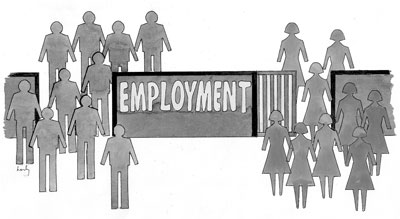State enterprises unsuccessful?

Among the many reasons put forward, to oppose the ‘Revival of
Under-Performing Enterprises and Underutilised Assets Bill’, is that
government institutions are by their very nature inefficient, and that
taking under-performing institutions under the public wing is tantamount
to their destruction.
It was used, for example, during the debate on the second reading of
the bill in Parliament last week, when the United National Party’s
Dayasiri Jayasekera said that in the past many private firms had been
taken over by various governments and that the results were
unsuccessful. The argument that state-owned enterprises are necessarily
wasteful, inefficient and unprofitable is also being wheeled out by the
UNP and its supporters on the ‘new media’ on the internet - in emails,
in blogs, in tweets and on facebook.

Global recession
The view that success is measured merely by profitability is an
ideological one that was given strength by the 1980s
Reaganite-Thatcherite revival of the extremist economic theories of
Ludwig von Mises, Friedrich Hayek and Milton Friedman. These ideologues
supplied the dogmatic foundations of the world economic house of cards
which started collapsing in October 2007, creating the current global
recession.
Interestingly, proponents of their reactionary creed, including the
Von Mises Institute, are now attempting to deflect the aims of the
worldwide protests, which followed ‘Occupy Wall Street’, away from the
greed of the super rich 1 percent towards governments.
In the post-2007 world, it is transparently obvious that an
institution’s success depends very much on the contribution it makes to
society rather than the amount of money which it makes its owners. No
institution that does not serve the interest of the public can be called
successful.
Societal interest
In the late 1970s, the Lucas Aerospace Company in Britain decided in
the name of profit to sack 20 percent of its workers. The shop stewards
of the firm drew up a plan to save the jobs which were being eliminated.
They aimed to shift the firm away from making weapons towards
producing goods that would benefit society. For example they designed a
vehicle called a ‘hobcart’ for children suffering from spina bifida, and
even got orders from Australia - but the company refused to make them.
The shop stewards eventually came up with some 150 ground-breaking
proposals, including a hybrid car, a portable life-support system, a
road-rail bus, as well as a scheme to manufacture kidney dialysis
machines. The Company threw out the plan because it interfered with the
profitable manufacture of weapons. Lucas Aerospace was a highly
successful institution from the point of view of profit. In terms of
societal benefit, it was a total failure.
Similarly, the American investment bank Lehman Brothers was super
efficient in terms of profit, but it brought society to its knees and
eventually made some 20 percent of Americans unemployed. It was to
prevent something similar from happening here that the government of Sri
Lanka took over the Seylan Bank.
Innovative practices
Economic Development Minister Basil Rajapaksa told the House that the
Sevanagala Company was not fulfilling its obligations in terms of
societal interest. It had been granted land to grow sugar cane, in order
to help bring prosperity to the people.
However, the company had been attempting to import molasses - a
by-product of the sugar refining process, which is used in making
alcohol. In other words, the company, finding it more profitable to
produce liquor rather than sugar, was shifting its production in that
direction.
The point should also be made that in this country, in the past, very
few institutions, which absolutely had to be taken over for one reason
or another, were actually nationalised. Foreign owned tea plantation
companies were nationalised primarily because they had been dis-investing
from Sri Lanka for some time. Replanting had not taken place, machinery
had not been updated. The resources taken from this island were being
deployed in new plantations in Africa.
The Ceylon Transport Board was created because the private bus
services were so very bad. Over its history from 1958 to 1977, the old
CTB did very well, not only providing a service, but also being a motor
for industrial development. It provided bus services in rural areas and
on uneconomic routes and late at night and early in the morning. The CTB
was actually the model which was adopted later, along with many of its
innovative practices, such as docking stations for engine and gearbox
replacement, by the Mumbai bus corporation, BEST.
Outstanding example

It was the UNP which ruined the CTB, filling it with political
hangers on, breaking it up into small companies, disposing of its assets
and so on. Today hardly anything remains of the modern Central Bus
Station which was begun in the 1970s, nothing remains of the Werahera
workshops or the ticket machine factory in Kotte.
Another outstanding example of a nationalised enterprise is the Bank
of Ceylon. It provided the benchmark for later private banks, so that
when the Sampath Bank was being created, it recruited its staff
wholesale from the nationalised giant.
It is ironic that the Seylan Bank, which ‘Business Today’ once ranked
as the third best company in Sri Lanka, had to be taken over by the Bank
of Ceylon in order to ensure its survival.
The majority of state enterprises were not in fact nationalised
ventures, but were created in order to fulfil a need which was not being
fulfilled by the private sector. The Ceramics Corporation, the Plywood
Corporation and Steel Corporation are examples of these.
Some of them have performed abysmally on being privatised. A supreme
example is the Textile Factory at Thulhiriya, built with modern plant
obtained from East Germany. After privatisation it was run into the
ground and the only things of value left are the land and buildings.
Thulhiriya provides an example of what can happen when the
unmitigated search for profit overrides the general public good. The
privatised company was actually very successful from the purely business
point of view, a disaster from Sri Lanka’s. |



